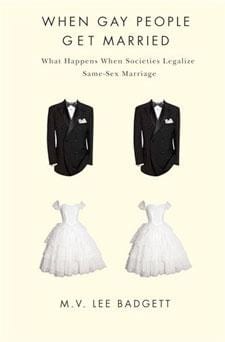Most academics write with careful detachment. But in her new book, When Gay People Get Married: What Happens When Societies Legalize Same-Sex Marriage, MV Lee Badgett opens on an unusually personal note, recounting her own decision to marry. Then again, Badgett is an unusual scholar. A professor of economics at the University of Massachusetts Amherst, she is well outside the mainstream of academia’s most relentlessly right-wing discipline. Interested in the economics of labour and sexual orientation, her last book was Money, Myths and Change: The Economic Lives of Lesbians and Gay Men.
This new book recounts a year Badgett spent studying marriage in the Netherlands. The Dutch were the first in the world to legalize gay marriage in 2001, and Badgett arrived in late 2003. When she and her partner left the United States, they could not share health insurance or even fill out the same customs form. By the time they returned home, they could marry in Massachusetts.
Pulling together others’ research, her own statistical analysis and in-depth interviews with 19 queer couples, Badgett has written a book less about the fight to win marriage rights than about what happens next. She is interested in why some couples choose to marry while others do not, whether marriage equality changes the institution of marriage in general and what impact marriage has on the queer community.
In the profiles of Dutch couples, Canadian queers will find plenty to identify with. Personal stories make for engaging reading, and the nitty gritty social science is tucked away in appendices, so the book is accessible to a general audience. It’s also an excellent survey of all the progress made towards marriage equality in North America and Europe — and a reminder of how messy and uneven that progress has been beyond our own borders.
Badgett takes opponents of gay marriage seriously so you don’t have to — her book is an ideal passive-aggressive gift for that homophobic uncle you’re tired of debating at family reunions. She thoroughly debunks conservative commentator Stanley Kurtz’s claim that gay marriage in Scandinavia and the Netherlands caused straight couples to marry at lower rates and give birth to more children out of wedlock.
“Stanley Kurtz actually was the person who made this issue come alive,” says Badgett over the phone from her office in Massachusetts. “It was everywhere, in op-ed pages all across America. It became the conventional wisdom for a while. And it just turned out to be completely misleading.”
Badgett illustrates, in exhaustive detail, that the trends Kurtz identified were well underway before gay marriage was introduced.
But her criticism is not confined to the right wing. She also has plenty to say to queer people opposed to marriage, a group she terms “marriage dissidents.”
“People talk about marriage as a patriarchal institution,” she says. “And I think they’re looking at marriage very much the same way that the right wing talks about it, that it’s about a particular set of roles that men and women are supposed to play.” She argues that the institution of marriage is a moving target. “They’re both looking at something that I don’t think exists anymore. I think marriage has changed tremendously.”
But that isn’t to say gay marriage is responsible for the change. “I don’t think it’s that gay people are changing what marriage means,” says Badgett. “I think that what’s probably changing is how heterosexual people see gay couples.”
At times Badgett seems a bit too eager to play down her own results. On monogamy she writes that most of the male couples she interviewed were not monogamous. This suggests that the queer community is developing its own concept of marriage. But Badgett focuses on the fact that in her interviews, despite this non-monogamy, her subjects said they aspired to be monogamous. She argues, oddly, that these aspirations are more important than actions.
For her part Badgett was most surprised to discover the emotional impact of gay marriage and how much marriage changed the way friends and family saw the couples.
“In some cases heterosexual people helped to remind gay people that they were in fact married, in funny ways, teasing people, saying, ‘You can’t call her your girlfriend anymore, she’s your wife,’” says Badgett. “Heterosexual people have expectations of gay people related to marriage, which I think is something that many gay people had no idea about.”

 Why you can trust Xtra
Why you can trust Xtra


